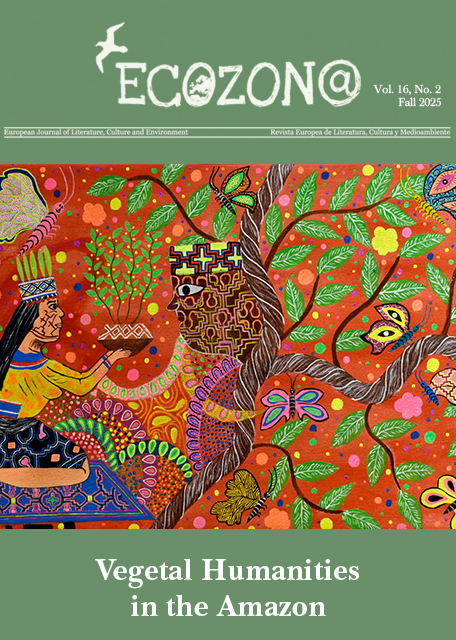<b>Two Series: “Rolling Drunk on Petroleum” and “4 Elements”</b>// Dos series: "Rodar borracho de petróleo" y "4 elementos"
DOI:
https://doi.org/10.37536/ECOZONA.2015.6.2.674Abstract
I recently read that Leonardo drew things in order to understand them. That pretty well describes why I make art: in order to clarify feelings or thoughts—while hoping that that’s interesting to other people. I’ve learned that to understand anything, I have to deliberately avoid a “style”, to avoid making images that repeat one another. Each thought or feeling needs its own “style”. Most of my images are for simple, visual pleasure, the pleasure of shapes, color, of space, of movement. All the work is exploratory and experimental, an adventure for me that I hope is enjoyable for you.
The works presented for this special issue belongs to two series of paintings, which are to be considered as meditations on our environmental foolishness: “Rolling Drunk on Petroleum” and “4 Elements.”
Kurt Vonnegut said, “Dear future generations: Please accept our apologies. We were rolling drunk on petroleum”, and his words inspired my three paintings of that title, “Rolling Drunk on Petroleum”.
The four elements, earth-air-fire-water (from the philosopher-scientists of the ancient Mediterranean) evolved into the splendid array of 118 chemical elements we now know. As the four evolved, however, they lost their moral dimension. The three paintings titled “4 Elements” are my attempt to find images that suggest that dimension. They speak of our need to balance the parts of our world and of our character. They add the astrological symbols which once provided a spiritual connection to their ruling gods: Venus? ; Saturn ? ; Jupiter ? ; Mars ? . I’m too much of a materialist to expect wonders from those symbols, but they’re a delight to look at.
Resumen
Recientemente leí que Leonardo dibujaba cosas para entenderlas. Eso describe bastante bien por qué hago arte: para clarificar los sentimientos o pensamientos—mientras espero que eso interese a otras personas. He aprendido que para entender cualquier cosa, tengo que evitar deliberadamente un “estilo”, evitar hacer imágenes que se repitan. Cada pensamiento o sentimiento necesita su propio “estilo”. La mayoría de mis imágenes son para el placer simple visual, el placer de las formas, del color, del espacio, del movimiento. Toda la obra es exploratoria y experimental, una aventura para mí que espero sea agradable para vosotros.
Las obras que se presentan en este número pertenecen a dos series de pinturas, que pueden considerarse meditaciones sobre nuestra insensatez medioambiental: “Rodar borracho de petróleo” y “4 elementos”.
Kurt Vonnegut dijo: “Estimadas generaciones futuras: Por favor, aceptad nuestras disculpas. Estábamos rodando borrachos de petróleo”, y sus palabras inspiraron las tres pinturas con ese título, “Rodar borrachos de petróleo”.
Los cuatro elementos, tierra-aire-fuego-agua (de los filósofos-científicos del Mediterráneo antiguo) evolucionaron en la espléndida variedad de 118 elementos químicos que hoy conocemos. A medida que los cuatro evolucionaron, sin embargo, perdieron su dimensión moral. Las tres pinturas tituladas “4 elementos” son mi intento de encontrar imágenes que sugieran esa dimensión. Hablan de nuestra necesidad de equilibrar las partes de nuestro mundo y de nuestro carácter. Añaden los símbolos astrológicos que una vez proporcionaron una conexión espiritual con los dioses en el poder: Venus? ; Saturno ? ; Júpiter ? ; Marte ?. Soy demasiado materialista para esperar maravillas de esos símbolos, pero es un placer contemplarlos.
Downloads
##submission.downloads##
Pubblicato
Fascicolo
Sezione
Licenza
Authors who publish with this journal agree to the following terms:
a) Authors retain copyright and grant the journal right of first publication with the work simultaneously licensed under a Creative Commons Attribution License that allows others to share the work with an acknowledgement of the work's authorship and initial publication in this journal (CC BY-NC for articles and CC BY-NC-ND for creative work, unless author requests otherwise.
b) Authors are able to enter into separate, additional contractual arrangements for the non-exclusive distribution of the journal's published version of the work (e.g., post it to an institutional repository or publish it in a book), with an acknowledgement of its initial publication in this journal.
c) Authors are permitted and encouraged to post their work online (e.g., in institutional repositories or on their website) prior to and during the submission process, as it can lead to productive exchanges, as well as earlier and greater citation of published work (See The Effect of Open Access).










